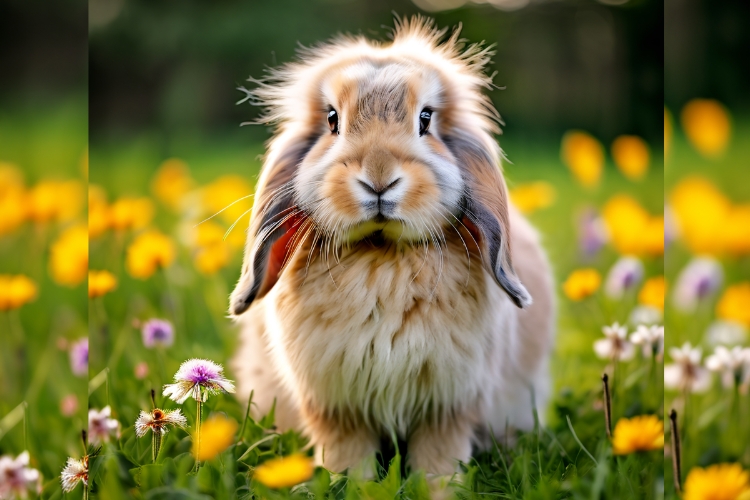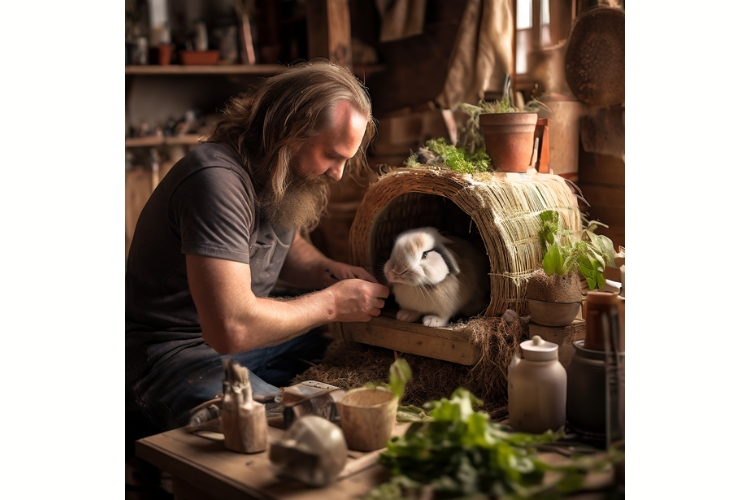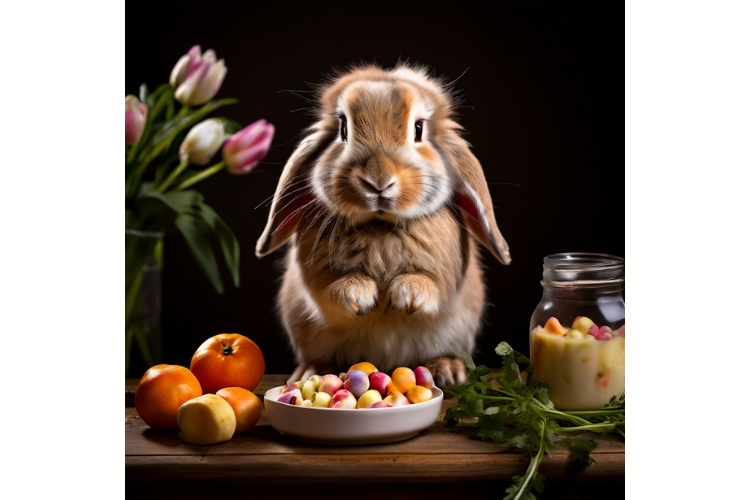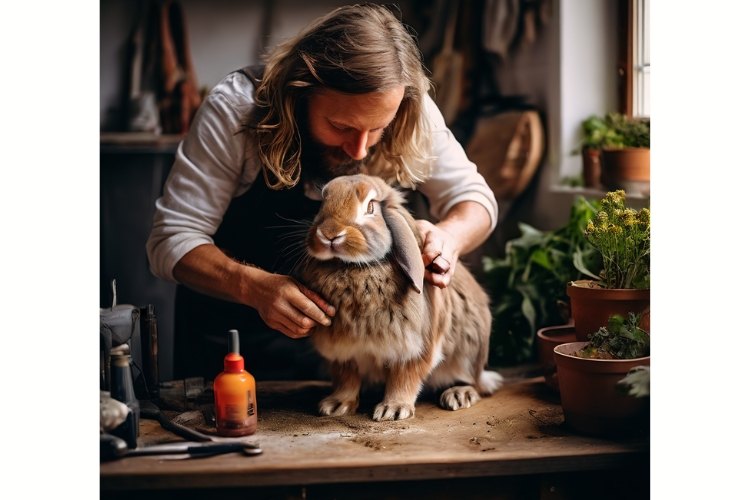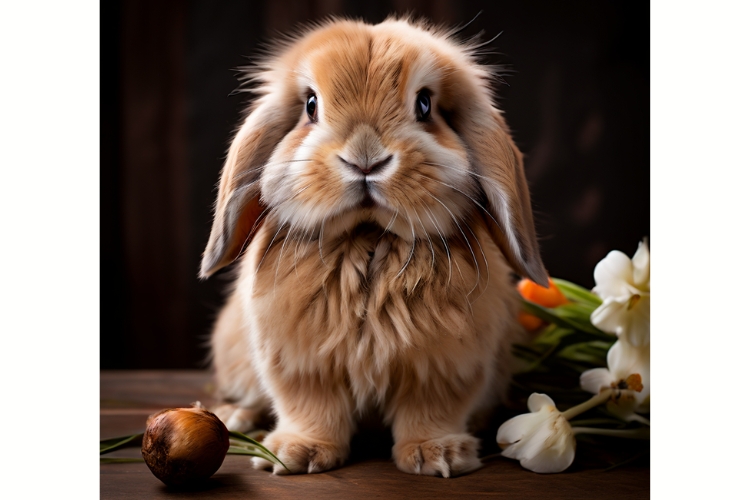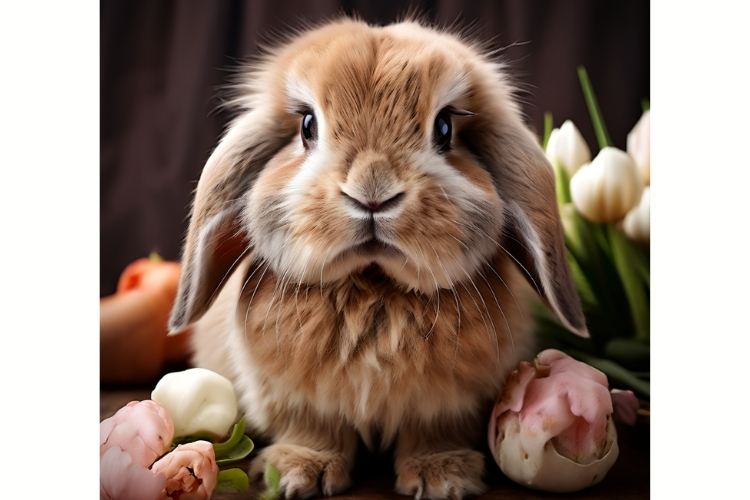With their endearing compact size, sweet expression, and lively yet gentle temperament, Holland Lops make wonderful pets. As one of the most popular rabbit breeds, their charming appeal comes as no surprise!
Behind that cute face, however, lies a living creature with complex care needs. Before bringing any rabbit home, and especially the Holland Lop, educate yourself completely on meeting their fundamental requirements for housing, feeding, grooming, health monitoring, and specialized attention.
Fulfilling these essential elements establishes a happy, low-stress life for your Holland Lop while forging a deeply rewarding human-rabbit bond!
Proper Holland Lop Housing
In the wild, rabbits traverse large territories while foraging and grazing. Our domestic Holland Lops retain these natural instincts for exercise and exploratory behavior. While supervised free-roaming time provides an ideal outlet, your Lop will also need safe, clean home base housing customized to support their activity requirements, hiding instincts, andoli waste habits.
Most veterinarians recommend a minimum space of 8 square feet inside their enclosure, with more space always better to encourage natural movement. Choose housing with ample vertical height to allow easy standing fully upright on back legs without hitting the ceiling.
Ideal enclosures offer multiple floor levels connected by ramps with access to hideaway spaces that make rabbits feel secure when resting below ground level.
Flooring should allow secure footing – wire mesh over deep litter trays or tight weave linoleum/tile patterns work well. Avoid slippery smooth surfaces. Place plush towels and toys throughout for comfy lounging. Maintain proper ventilation and reasonable climate control in their living space. While adaptable to temperature fluctuations, optimal range falls between 55-75 F.
Finally, diligent housekeeping proves vital. Remove soiled litter, uneaten food, and damp bedding daily. Thoroughly wash food bowls, litter boxes, hides, and accessories weekly. Disinfect entire enclosure monthly (more often for un-neutered/unspayed buns) using gentle rabbit-safe cleansers. Their home must stay clean, dry, and hygienic.
Proper Feeding for Healthy Holland Lops
Feeding seems fairly straightforward…just pour some rabbit pellets into a bowl, add veggies/fruit for treats, and provide unlimited timothy hay, right? Not quite! Each component plays important roles supporting your Holland Lop’s health and requires educated choices.
- Pellets – Select reputable rabbit-formulated brands with controlled calcium/protein levels. Feed adult Lops 1/4-1/2 cup daily.
- Vegetables – Introduce variety gradually. Optimal choices – dark leafy greens, broccoli, peppers, carrots, celery, parsley, cilantro, bean sprouts.
- Fruits – High in natural sugars so feed sparingly as treats. Stick with apple, peach, melon pieces, berry combinations.
- Hay – ALWAYS provide unlimited timothy grass, oat hay, Botanical blends. Vital for dental health and digestion.
- Treats – Healthy snack options include rosebuds/petals, mint leaves, basil, dill. Reduce pellets to account for treats calories.
- Water – Filtered, fresh daily. Use heavy bowls to avoid spills/waste.
Follow all packaging instructions carefully and adjust portions to maintain optimal weight. Feed at consistent times in clean receptacles. Frequently monitor eating habits – decreased intake signals illness necessitating prompt veterinary care. Support healthy digestion with regular exercise and gentle tummy rubs too!
Grooming Basics
Though their fur appears high-maintenance, Holland Lops only require occasional light grooming. Here’s what to regularly address:
- Brushing – Once or twice weekly removes loose hair and redistributes skin oils for sheen. Use a soft brush and avoid pulling delicate skin.
- Bathing – ONLY bathe if truly dirty or medicated shampoo prescribed. Use lukewarm water; thoroughly dry coat after.
- Nails – Trim every 6-8 weeks unless worn down naturally through activity on abrasive surfaces. Have vet instruct proper nail trimming technique.
- Ears – Gently wipe inside ear flaps using cotton balls dipped in mineral oil to remove wax and debris monthly. Seek vet assistance if infection signs appear.
- Teeth – Provide unlimited hay plus safe wood toys for gnawing to continually wear teeth. Seek vet dentals if alignment/overgrown issues occur.
- Molting – Increased brushing during seasonal sheds helps transfer fur from ingestion during self-grooming.
Regular at-home grooming promotes bonding while letting you monitor skin, coat, feet, and body condition closely for indications of health issues needing attention.
Recognizing Common Holland Lop Health Issues
Even with stellar care, Holland Lops may occasionally suffer certain breed-specific disorders. Learn to recognize the following common health issues:
- Sore Hocks – Ulcerative pododermatitis causes painful rear footpad lesions if housed on wire-mesh or rough surfaces. Address housing flaws; treat lesions under vet direction.
- Malocclusion/Overgrown Teeth – Misaligned biting surfaces causes painful overgrowth. Requires lifelong vigilant dental care, possible trimming.
- GI Stasis – Stress can slow/stop gut mobility leading to dangerous bloat, toxins. Line stomach; increase movement.
- Ear Canker – Thick discharge and head-shaking indicate inner ear infection. Treat with prescription meds.
- Conjunctivitis – Red, weepy eyes signal infection. Administer rabbit-safe antibiotic drops/ointment.
- Pasteurellosis – Lethargy, appetite loss are common signs. Antibiotic injection, diligent nursing usually effective.
- Urinary Tract Issues – Discomfort/blood urine point to infection or bladder sludge. Increase hydration; prescribe solutions.
- Arthritis – Stiffness from aging joints eased via exercise, glucosamine supplements.
- Rectal Prolapse – Genetic predisposition causes horrifying yet safely treatable rectal lining eversion.
Spaying/neutering, balanced nutrition, clean environment, attentive preventive care, and prompt illness intervention all help minimize these problematic disorders in Holland Lops. Still, being aware empowers you to act quickly when issues emerge!
Caring for Special Holland Lop Needs
While Holland Lops share universal requirements with other rabbit breeds, fulfilling a few special needs can further enhance your tiny bundle’s health and happiness!
- Dental Vigilance – Misaligned Holland Lop teeth often overgrow without continual wearing. Provide unlimited chew toys plus twice annual veterinary dental checks for trims/alignment.
- Protect Delicate Ears – Lop ears prone to infection from debris buildup, scratches from running through vegetation. Gently restrain errant head pokes!
- Soft Landings – Short Lop legs risk injury if allowed to jump from beds, couches. Provide ramps/steps for safe access to raised play areas.
- Climate Control – Sensitivity to temperature extremes given tiny body mass and dense coat. Ensure their space stays appropriately warm/cool.
- Lonely Hearts – Sociable breed requires abundant affection, interaction to thrive. Bond closely and provide companions if left alone for long workdays.
When cared for attentively and lovingly, Holland Lops return the favor doubly by blessing owners with years of delightful snuggles and entertainment from their bubbly little spirit!
Identifying Reputable Holland Lop Breeders
Deciding to welcome one of these precious fur babies into your home ranks among the best decisions ever! Take time however selecting only the most responsible, ethical Holland Lop breeder. Confirm any prospective source:
- Focuses foremost on breeding for health, temperament and breed improvement over profits
- Handles all rabbits humanely and maintains clean, spacious housing
- Provides comprehensive health and genetic screening; offers health guarantees
- Encourages you to visit their rabbitry and meet parent rabbits
- Belongs to ARBA and/or other respected cuniculture associations
- Provides support, advice, resources for the rabbit’s lifetime
A quality breeder gladly answers questions and start you off on sound footing with your Holland Lop. Develop an ongoing relationship as you journey deeper into Holland Lop ownership!
In Closing
Holland Lops steal hearts with ease thanks to their tiny, perfected proportions plus friendly, lively ways. Don’t let cuteness override duty however in meeting their specialized care needs for optimal health and wellbeing.
By educating yourself completely and making thoughtful preparations for diet, housing, grooming, veterinary care and dedicated bonding time, your pint-sized bundle of Lop joy will thrive under your attentive devotion. Here’s wishing many happy, nose-nuzzling years ahead with your darling Holland Lop!

